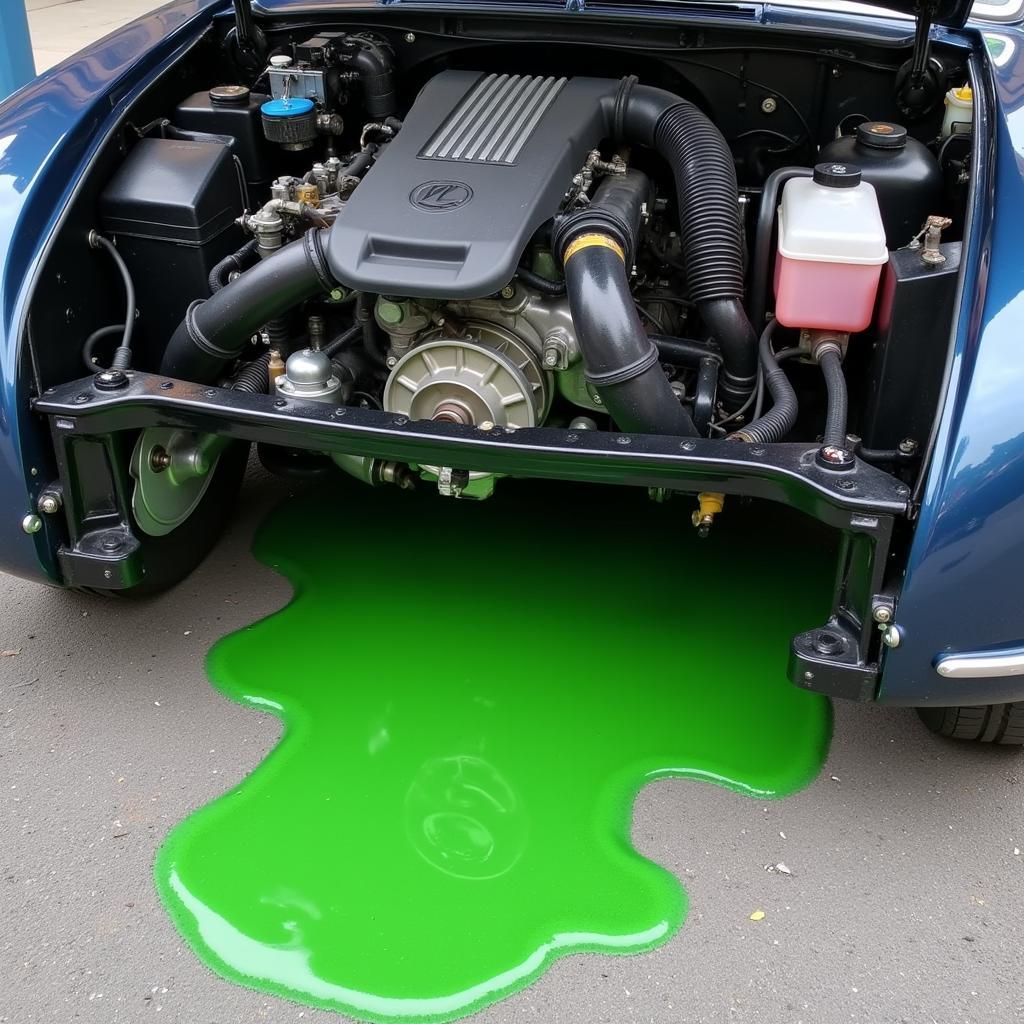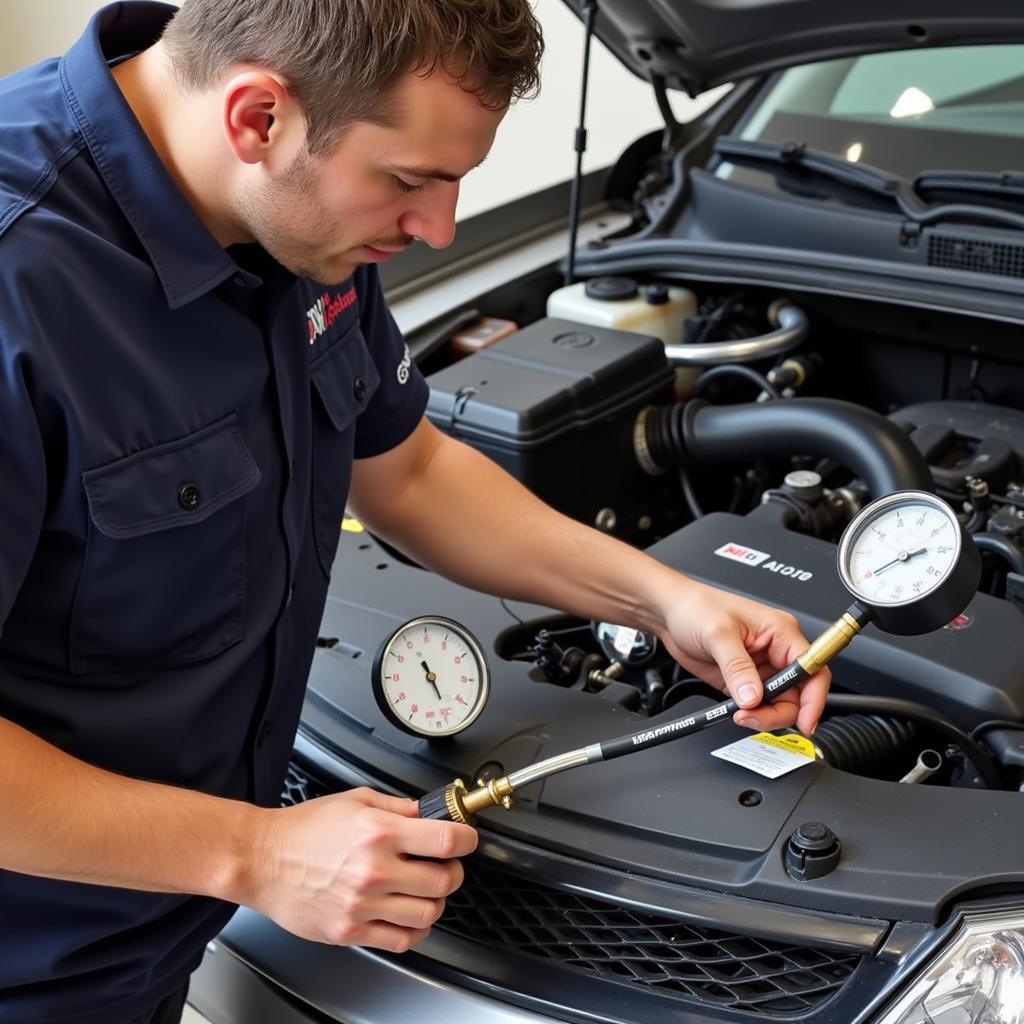Coolant leaking from your engine is a serious issue that needs immediate attention. Ignoring it can lead to overheating, engine damage, and costly repairs. This comprehensive guide will help you troubleshoot and potentially fix the problem, whether you’re a car owner, a mechanic, or an automotive technician.
 Coolant Leak from Engine Overview
Coolant Leak from Engine Overview
Identifying the Source of the Leak
Pinpointing the source of a coolant leak can be tricky. It often requires a systematic approach. Start by visually inspecting the engine bay for obvious signs, such as puddles of coolant, white residue, or stained hoses. Remember, coolant can be green, orange, pink, or even blue, so don’t just look for green fluid. If the leak isn’t immediately obvious, consider pressure testing the cooling system. A pressure tester can help identify leaks in the radiator, hoses, water pump, or even the engine block itself. A leaky water pump is a common culprit, often indicated by coolant dripping from the weep hole on the pump housing.
If you’re experiencing toyota camry 4 cylinder car problems, a coolant leak could be one of the symptoms.
Common Causes of Coolant Leaks
Several components can contribute to coolant leaking from the engine. These include:
- Cracked or damaged radiator: Look for cracks or leaks in the radiator fins or tanks.
- Leaking hoses: Inspect hoses for cracks, bulges, or soft spots, especially at the connection points.
- Faulty water pump: Check for leaks around the water pump weep hole or shaft seal.
- Damaged thermostat housing: Inspect the thermostat housing for cracks or leaks.
- Blown head gasket: A blown head gasket is a serious issue that can cause coolant to leak into the oil or combustion chamber. Symptoms include white smoke from the exhaust, milky oil, and overheating.
Troubleshooting Coolant Leaks: A Step-by-Step Guide
- Allow the engine to cool completely: Never work on a hot engine.
- Locate the leak: Visually inspect the engine bay for signs of coolant leakage.
- Check the coolant level: Ensure the coolant level is within the recommended range.
- Inspect the radiator and hoses: Look for cracks, leaks, or loose connections.
- Check the water pump: Inspect the water pump for leaks and proper operation.
- Examine the thermostat housing: Check for cracks or leaks around the thermostat housing.
What to Do if You Suspect a Blown Head Gasket
If you suspect a blown head gasket, it’s crucial to have it diagnosed by a qualified mechanic immediately. Continuing to drive with a blown head gasket can lead to catastrophic engine damage.
Overheating can also be a symptom of other car problems, like the heat temperature problems on a 2004 lincoln town car.
Why is My Car Leaking Coolant?
A coolant leak can stem from a variety of issues, ranging from a simple loose hose clamp to a more serious problem like a cracked engine block. Regular maintenance and timely repairs are essential to preventing coolant leaks.
“A small leak can quickly become a big problem if ignored,” says John Miller, a seasoned automotive technician with over 25 years of experience. “Regularly checking your coolant level and inspecting your hoses can save you from costly repairs down the road.”
 Pressure Testing Cooling System
Pressure Testing Cooling System
How to Prevent Coolant Leaks
Preventing coolant leaks involves regular maintenance and inspections. Here are some tips:
- Regularly check the coolant level: Ensure the coolant level is within the recommended range.
- Inspect hoses and belts: Replace worn or damaged hoses and belts.
- Flush the cooling system: Flush and refill the cooling system according to the manufacturer’s recommendations.
- Use the correct coolant type: Use the coolant type specified for your vehicle.
- Address any leaks promptly: Don’t ignore even small leaks.
A car high idle problem can sometimes be related to overheating issues, indirectly linked to coolant leaks.
Conclusion
Troubleshooting Car Problems Coolant Leaking From Engine requires a systematic approach and a good understanding of the cooling system. By following the steps outlined in this guide, you can identify the source of the leak and take the appropriate action to fix it. Don’t hesitate to contact us at AutoTipPro at +1 (641) 206-8880 or visit our office at 500 N St Mary’s St, San Antonio, TX 78205, United States for professional assistance.
“Early detection and prompt action are key to preventing major engine damage,” adds Susan Davis, a certified automotive engineer. “Don’t underestimate the importance of regular maintenance.” Issues like porsche cayman car problems can sometimes be traced back to overlooked maintenance, including coolant leaks.
Remember, alero car 2004 overheating problems can often be caused by coolant leaks, highlighting the importance of addressing them quickly.




Leave a Reply